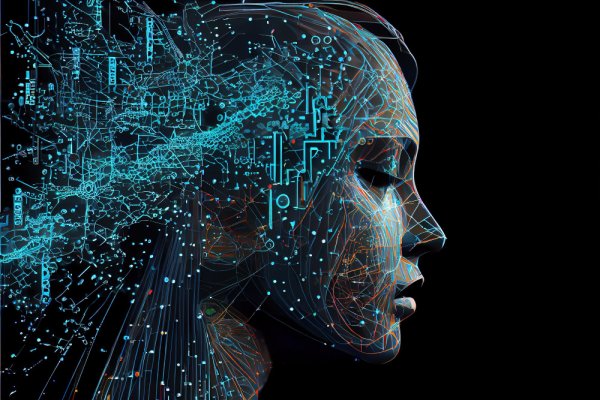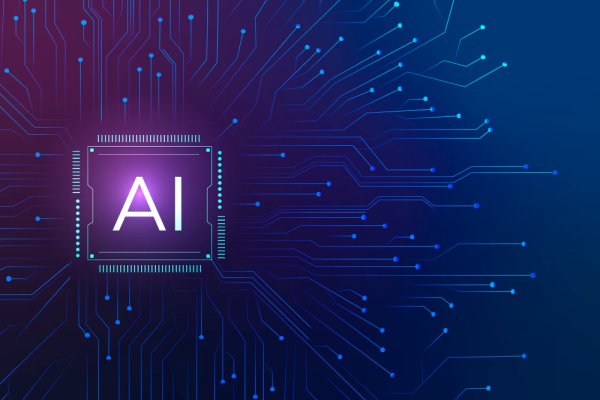AI Doesn't Exist
Reading Time: 9 minutes, 38 secondsAngela Collier is a PhD theoretical physicist with an engaging YouTube channel. Her videos concentrate on science communication. She's interesting, witty, and fun to watch. She's obviously far smarter than I am. Recently, I came across a video she posted on YouTube about three months ago, where she talked about AI and how it doesn't, actually, you know, exist. I've embedded it below, so you can give it watch.
This really prompted several ideas I wanted to cover, as well as some comments to some of Dr. Collier's points.
Words Mean Things
What we call "Artificial Intelligence" or "AI" isn't intelligent. It can't think or reason. It can't make discriminations or judgements. What it can do is store vast amounts of data, then find similarities or relationships between different data points. Using those similarities or relationships, the model can use a very long and complex decision tree, largely based on "yes/no" answer nodes, to arrive at a result. This process largely consists of following a set of step-by-step linear instructions.
Yet, we constantly hear sentences like, "We can train our AI model so that it can learn a set of data to make decisions and provide predictions." The trouble is that this language introduces several concepts that mean something entirely different from what they would mean if applied to humans.
Let's just take the concept of learning, as an example. We don't train humans by simply giving them a large set of facts. Certainly we provide facts in education, but we also provide examples, counter-examples, guiding principles, and so forth. Nor does the learning we receive exist in a vacuum. There's a whole universe of experience, outside the curriculum of a specific subject, that humans bring to education. That external experience informs people about how they can apply that learning to the real world.
To use Dr. Collier's example, let's say that you want to use a Large Language Model (LLM) AI like ChatGPT to write a school paper about Pocahontas. You can certainly do so, and the LLM will produce it quickly. But you may notice, on the second page, that the paper discusses how Pocahontas could speak with trees, and that her best friend was a talking, singing raccoon. Even if you know nothing at all about Pocahontas, you'll automatically know that this is just wrong. Our experience of the world informs us that we cannot have discussions with trees, other than extremely one-sided ones, and that raccoons, no matter how delightfully adorable, neither sing nor speak with us. Your experience of the world lets you know automatically that you aren't learning a fact about Pocahontas that you didn't previously know. You know, instantly, that you're being fed a falsehood. So, the question then becomes, why doesn't ChatGPT know that talking trees and raccoons aren't real?
Well, it's because ChatGPT didn't "learn" about Pocahontas. Instead, it ingested a large amount of text that mentions Pocahontas and, following a set of instructions, created a huge database of Pocahontas references. Those references might include a plot synopsis of the Disney cartoon about her. When asked, it strings those references together in the appropriate style and presents it as a paper. It doesn't "think" about Pocahontas. It didn't make judgements about what was likely to be true or false about her. The plot synopsis of Pocahontas is just as valid as an exhaustively researched historical text.
Similarly, in a real-world example, lawyers in an active lawsuit submitted a federal court filing written in ChatGPT that contained references to six fictional court decisions. They were sanctioned for it. Presumably, in this case, ChatGPT followed the instructions about producing a result in the proper format for a legal brief, which usually has many case citations. Case citations are needed in that format, so ChatGPT added some.
Where did it go off the rails. We don't really know. Perhaps the average legal brief contains, say, 26 case citations, but ChatGPT could only find 20 citations that were on point for this specific topic. So, perhaps ChatGPT added an additional six citations to ensure the output met the average occurrence of case citations in a legal brief. We don't know. What we do know was that the format was apparently perfect. The content, however, not so much. And when the judge tried to research the citations, hilarity ensued.
 We use many value-laden terms about what we call "artificial intelligence" that imply human-like experience in thinking and cognition that can't be applied to computers. Humans don't think linearly, but non-linearly. This mode of thought enables a person to make connections between seemingly unrelated bits of information, or apply principles from one area of life to others.
We use many value-laden terms about what we call "artificial intelligence" that imply human-like experience in thinking and cognition that can't be applied to computers. Humans don't think linearly, but non-linearly. This mode of thought enables a person to make connections between seemingly unrelated bits of information, or apply principles from one area of life to others.
Computers, on the other hand, are purely linear. They can progress through a programmed decision tree step-by-step, and process billions of equations per second, but the only relationships they can make are the ones they are told to make. Indeed, the physical structure of computers forces linear data processing on the software that runs on it. This structure is fundamentally different from the mesh or web-like connections between neurons in the human brain, which themselves follow a non-linear path. The very structure of the human brain makes humans automatic pattern-matching machines.
So, the language we use about AI invokes meanings that aren't relevant to computer systems. The language we use implies cognition and consciousness; it implies concepts and behaviors that are only true of humans. And, yes, I understand we use such language as a shorthand for something far more technical. But using this language implies things that aren't true. In doing so, it corrupts our understanding of what AI actually does, which, at it's core, is to run a linear string of commands.
It's very good at running those commands, but it's only programmed behavior.
Asymmetric Information
In the field of economics, which made up much of my undergraduate and post-graduate study, there's a concept called asymmetric information. We sometimes call this imperfect information, or the information gap. There are many facets to imperfect information, but the one that's relevant here is that it's impossible to have perfect knowledge of every transaction that occurs in the economy.
Actually, it's impossible to have perfect knowledge about individual transactions in which you personally engage, such as buying a used car. You don't know how the car was driven, whether there's damage that's been concealed from you, or many other aspects of the transaction. There may be issues with the vehicle that neither you nor the seller knows about, but which will require an expensive repair.
 One of the reasons why planned economies tend to be so inefficient in both use of money, materials, and other inputs, is that no relatively small group of planners can create a plan that adequately matches reality. When you're creating the Five Year Plan for the Worker's and Peasant's Paradise, there's a lot you don't know You don't know that next year is going to have an unseasonably dry growing season, and there's going to be less wheat or corn. You don't know that the year after that, a revolution in the country that supplies your rubber is going to cut off that supply. Or that a pandemic the year after that will snarl up supply lines, increasing your prices and lead times for industrial inputs. A modern economy is so complex, and requires so much information—much of which is subject to change—that it's impossible to effectively plan.
One of the reasons why planned economies tend to be so inefficient in both use of money, materials, and other inputs, is that no relatively small group of planners can create a plan that adequately matches reality. When you're creating the Five Year Plan for the Worker's and Peasant's Paradise, there's a lot you don't know You don't know that next year is going to have an unseasonably dry growing season, and there's going to be less wheat or corn. You don't know that the year after that, a revolution in the country that supplies your rubber is going to cut off that supply. Or that a pandemic the year after that will snarl up supply lines, increasing your prices and lead times for industrial inputs. A modern economy is so complex, and requires so much information—much of which is subject to change—that it's impossible to effectively plan.
Obviously, when these things happen, the plan has to change. There's a lag required to get the planners together to study and change the plan. Changes to one portion of the Four Year Plan will have ripple effects on all the other pieces of the plan. All of these various ripple effects have to be identified, and the plan revised and promulgated so that everyone knows that the new plan is. Then the government has to approve it. Finally, the new economic directives can go out to all the production facilities to revise their quotas. And, of course, if the planners made a mistake in assessing the results of the plan changes, then we have to go through the whole rigmarole of planning again.
Market economies don't have this problem (Don't worry, they have other asymmetric information problems). When a "black swan" event occurs, every participant can change their economic behavior to respond. Economic results in a market economy are not the result of planning, but the result of millions of producers and consumers making independent, voluntary decisions and transactions. Market economies tend to adjust to a black swan event more quickly and more efficiently.
In terms of cognition and thought, humans are market thinkers. Computers, sadly, are planned thinkers. Humans can change their behavior and patterns to respond to reality. OK, sure, a lot of people don't do this, even when they should, but the important thing is that they can. Equally important is that computers and software can't.
The way an AI system responds to unexpected event is pre-defined. If an unexpected condition occurs, the system's response is limited to the alternatives that have been defined by its programmers. If those alternatives are insufficient to correct the problem, the programmers have to write new code to correct the problem. But computer programmers, like economists, cannot predict and account for every single response, or to the ripple effects that might arise from the changes they make. Software devs are just as much a slave to the problem of asymmetric information as anyone else.
Even if we assume, arguendo, that an AI has sophisticated enough programming to enable it to devise its own response, the path it must take to create that new response can only occur along planned lines. Even the AI method of creating novel responses can only follow the parameters imposed by its programmers.
AI is a simple, though incredibly fast, pattern matching system built by fallible people who not only don't and can't know everything, but who don't even know what it is that they don't know.
The Tools Don't Build the House
So, in my day job, part of what I do is supply the documentation for my company's products. Over the last 14 years or so, I've written about 4,500 pages of documentation. It's a complex product, and the documentation is equally complex.
Our experience has been that normal search features aren't great at finding documentation that addresses specific issues. If you don't know what a widget is called, for example, how do you search for it? Searching for "the thing that does x" doesn't provide very good results. Search engines try to find key terms, which is a problem when you don't know those terms.
So, we implemented an AI system based on ChatGPT that can be accessed via a chatbot on our documentation website. You can ask it more general questions in plain English and receive a better, more relevant answer. The data set the AI system contains is relatively small. It just has to know the contents of our product documentation, training courses, and the transcripts of some training videos. So, we have a powerful LLM, indexing a relatively small corpus of text. It should be perfect.
But it isn't. It's better than the search engine, but I've asked it questions and received glaringly wrong answers. Sometimes, I've been flabbergasted at how wrong the answer was. I've learned, over time that how I phrase the question often determines how good the answer is. I know that if I were to ask the same question to another product expert at my company they'd be able to provide the correct answer instantly.
The thing is, AI is a tool. It's a sophisticated tool, and it can go through a lot of information to provide an "answer". But what it can't do is invoke a mental model that can supply context from experience and knowledge, then evaluate an inartfully worded query to figure out what you mean to ask, as opposed to what you actually asked.
People can do that because they naturally think in metaphorical terms. If I say, "It's raining cats and dogs", you know that what I mean to say is that a heavy rainfall is occurring. You don't assume that schnauzers and tabbies are descending from the heavens and exploding on the pavement in a shower of gore.
Conversely, computer-based systems are literal. I mean, sure, you could, given enough time and storage space, program the computer to convert every metaphorical expression in English to a literal meaning. Mostly. But it would be difficult, and still imperfect, because metaphor is a tricky thing.
 For example, let's take a look at the simple phrase, "That's so bad!" We might use this same expression to respond to friend showing us his new Ferrari or telling us he's getting a divorce. The context in which we say, "That's so bad!", determines what we mean, along with non-verbal cues like facial expressions or tone of voice. Once again, as humans we know how the response is intended. The problem of how to program an AI system to identify all those contextual cues is daunting. Especially from and evaluation of text, where those cues don't exist.
For example, let's take a look at the simple phrase, "That's so bad!" We might use this same expression to respond to friend showing us his new Ferrari or telling us he's getting a divorce. The context in which we say, "That's so bad!", determines what we mean, along with non-verbal cues like facial expressions or tone of voice. Once again, as humans we know how the response is intended. The problem of how to program an AI system to identify all those contextual cues is daunting. Especially from and evaluation of text, where those cues don't exist.
AI is a tool. Like any tool, you have to identify when it's useful, and how to use it properly. You can't show up at a construction site and dump off a truckload of expensive Craftsman tools with the expectation that they'll build a house. Nor can you use a shiny new hammer to screw in the wood screws that hold the frame together. You can use the tools to save yourself time and effort. You can choose the right tools for specific jobs. But, in every case, you are providing the ends to which the tool will be put.
AI is no different. We can use it to chomp through large data sets, and provide us with aggregate answers that might inform our decisions. It's great to have a tool that can synthesize large masses of information in ways that we never can, and provide an estimate of probable outcomes far faster than we'd ever be able to do it. It's a great way to assist us in making decisions.
But it's a pretty poor tool for replacing us. AI can provide the means for performing many tasks. But it lacks the actual cognition, knowledge, and creativity to supply the ends to which the means are put.